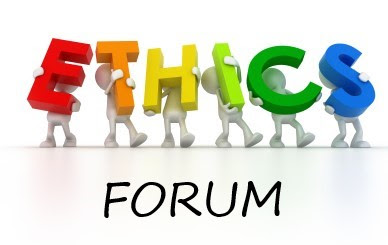Ethics Updates was founded in 1994 by Lawrence M. Hinman, a professor of philosophy at the University of San Diego. Originally, it was intended to update the bibliographical essays in two of his books, Ethics: A Pluralistic Approach to Moral Theory and Contemporary Moral Issues.
The site offers an on-line library of classic texts in ethics and a Calendar listing information about ethics-related conferences around the world. The Forums provide a place for students to discuss the ethical issues covered in the site. The Case Studies presents numerous studies in applied ethics, each case is accompanied by a discussion folder. The site also contains guides to writing ethics papers, a glossary of key terms, and a section on "Philosophers Speak Out on Issues of War, Peace, and Terrorism."
In 1996, Larry Hinman began the Ethics across the Curriculum program at the University of San Diego with a grant from the E. L. Wiegand Foundation. He has developed an Ethics across the Curriculum website to accompany that initiative.
In 1997, Hinman began videotaping the visiting Ethics across the Curriculum scholars—Carol Gilligan, Tu Weiming, Dan Callahan, Michael Walzer, and Michael Josephson—who were giving lectures and workshops on campus. He received a grant from the E. L. Wiegand Foundation for the development of Ethics Videos, a web site devoted to streaming video of ethics-related lectures, discussions, and interviews.
Hinman developed relationships with several organizations and universities, including the American Philosophical Association, the Association for Practical and Professional Ethics the Kenan Institute of Ethics and the Center for Academic Integrity—to provide video streaming of their ethics events for the Web. He also began doing a series of interviews with contemporary moral philosophers, discussing their work with them in a conversational format. In addition, he made his own lectures on ethical theory and contemporary moral issues available in streaming video, along with accompanying PowerPoint presentations. At the beginning of 2004, the website ocntained over three hundred videos. Moreover, the quality has improved dramatically, and Ethics Videos now streams VHS-quality full screen broadband video of its most recent lectures and is in the process of updating earlier videos to this new standard.
In 2003, Hinman received a grant from the Skirball Foundation for American Values to hold an initial meeting of individuals, both academics and non-academic professionals, working in the area of ethics. This meeting was intended to foster communication between those who do ethics in the classroom and those who do ethics "in the trenches" as members of hospital ethics boards, mulicipal ethics commissions, and the like. In addition, it was intended to encourage interaction between those individuals in southern California and their counterparts in Baja California, Mexico. The result of this effort was the formation of the Ethics Consortium of Baja and Southern California, which has its own website.
Ethics Updates and its associated websites are housed in the Values Institute at the University of San Diego. The Institute is directed by Larry Hinman. Leeanna Cummings is the Executive Assistant to the Philosophy Department and the Values Institute.

2 comments:
For me, there is no greater area of study than ethics. As they move into the business world, this knowledge will make or break them. Organizations such as XXX, have negative results because the people on board cannot tell the difference between right and wrong. Due to scope, these consequences usually take longer to materialize, but is the result the same? You can find a ton of articles and books about business ethics about businesses “losing their way,” e.g., WorldCom, Tyco, Enron. You can also sign up for seminars where they preach to “do the right thing.” They paint the world in stark black and white. These resources ask one-dimensional ethical questions, such as, “Should you take kickbacks from suppliers?” For me, ethics in the workplace is varying shades of gray. You have to rely on moral law, that is, does it ‘feel’ wrong? It’s easy to say, “There is right, and there is wrong.” In my management book, Wingtips with Spurs, I address these issue in detail. All major corporations have their written code of conduct. Each one is pretty much just a copy of the others and is a major dust bunny. The next time you walk into someone’s office, ask to see the company code of conduct. Good luck on finding someone who will produce it within five minutes. The moral law is much easier to find and digest. It resides in each of us. Michael L. Gooch, SPHR www.michaellgooch.com
Hi, Michael. Welcome to Ethics Forum. You wrote, "All major corporations have their written code of conduct. Each one is pretty much just a copy of the others and is a major dust bunny."
My Organizational Management students have to research the ethical guidelines of 3 companies (at least 1 must be multinational) and present a Power Point Presentation comparing the codes and goverance. This is always interesting because many companies have 200+ page manuals and others have short "mission statement" type codes, easy to remember but almost impossible to enforce. The students also find that the HR people usually can't cite the code or quickly lay their hands of it, yet these are the people who determine who gets hired. Student research indicates that American Businesses have take a laisses faire approach to Ethics. This is good and bad.
In Socialist countries the government imposes uniform ethical codes and enforces them. This doesn't leave room for experimentation, innovation or what you call "the Moral Law." Yet if American Businesses don't get on the ball with Ethical codes and enforcement, we too may see the government step in. In some industries, such as meat packing, this has already happened.
Post a Comment